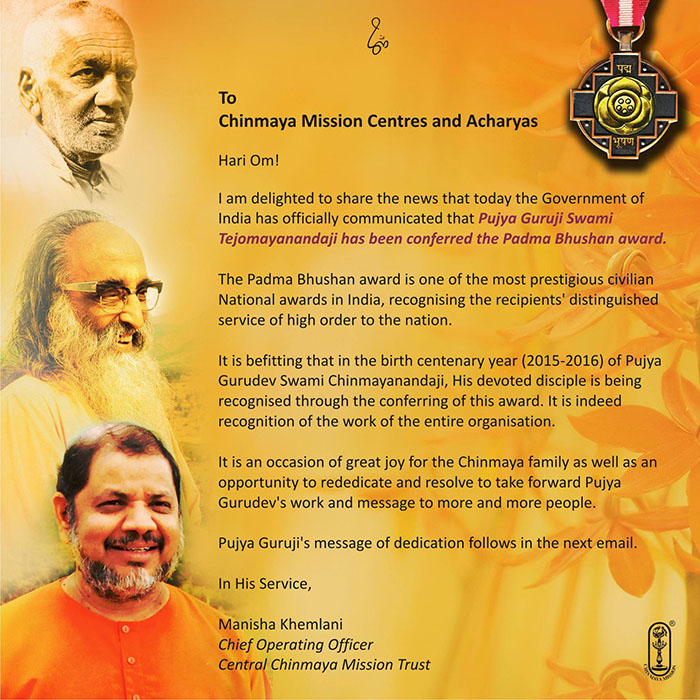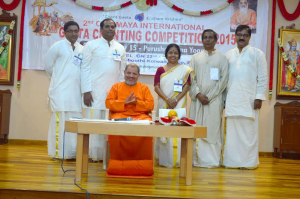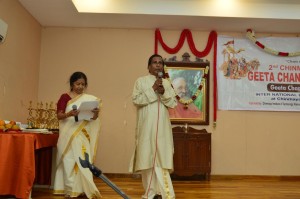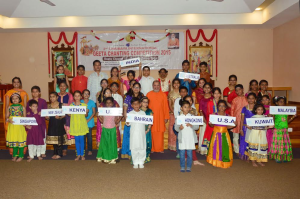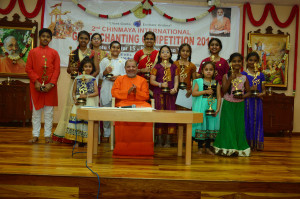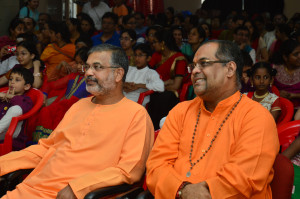Author Archives: Web Master
Dedication of Padma Bhushan
I thank the Government of India for bestowing on me the honour of Padma Bhushan.
In all humility I dedicate this Padma Bhushan award to my beloved mother, respected father, revered Gurudev Swami Chinmayananda, and the most worshipful #God with whose grace and blessings alone this prestigious national recognition has been conferred on me.
I thank all my well-wishers who have been sending messages of congratulations to me with great love and regard.
With Prem & Om,
Swami Tejomayananda
Padma Bhushan Award for Pujya Guruji
Delighted to share the news that today the Government of India has officially communicated that Pujya Guruji Swami Tejomayananda has been conferred the #Padma Bhushan award.
The Padma Bhushan award is one of the most prestigious civilian National awards in India, recognising the recipients’ distinguished service of high order to the nation.
It is befitting that in the birth centenary year (2015-2016) of Pujya Gurudev Swami Chinmayananda, His devoted disciple is being recognised through the conferring of this award. It is indeed recognition of the work of the entire organisation.
To Fulfil or Not to Fulfil ?
Desire is the constant enemy of the wise man. In this context the term ‘wise’ refers neither to a man of enlightenment nor an ‘ignorant’ man who continuously seeks pleasure from the outside world.
The man of enlightenment is not troubled by desires as he is always content and revelling in the Infinite Self.
The ‘ignorant’ person feels very happy when a desire crops up; he rushes to fulfil it and enjoys the consequent result. His main preoccupation is to satisfy all the desires that arise in his mind.
Dilemma of the Wise
It is the ‘in-between’ man, who is disturbed by desire. He has understood that desires cause problems and agitations. They lead to wrong doing. Yet, at the same time, he is unable to give them up. That is a very unenviable position. Let us take the example of a simple desire of going to watch a movie. We know it is a useless movie, but still head to the Cineplex. On reaching there, we feel guilty, ‘What a foolish thing I have done. It is a waste of time and money.’ Hence, we neither enjoy the movie nor can we give it up.
Such people are constantly troubled by their desires. When a desire crops up, they cannot overcome it; but when they attempt to fulfil it, the wisdom and understanding gained through previous experiences interfere with the enjoyment. Therefore, the person laments, ‘Anything that I want to enjoy, I know it is illegal, immoral or fattening. But what to do, I just can’t give it up! I have read so much about the evil effects of overeating, drinking and smoking, that I have stopped reading altogether!’ He does not heed the warning of the intellect because he does not have the will power to say, ‘No’.
Abode of Desire
Now, having discussed who the enemy is and how it veils our wisdom and understanding, Sri Krishna tells us where the foe, desire, resides and its methodology of operation. Thereafter, Bhagavan reveals how to gain victory over this mighty and seemingly invincible enemy. He gives a complete and perfect answer to Arjuna’s question.
The Lord points out that the dwelling places of desire (kama) are the sense organs (eyes, ears, nose, tongue, skin), the mind and intellect. Through these, desire deludes man. It puts a veil over the ‘light’ of his understanding and knowledge. When a thief wishes to rob a house, he first cuts off the power supply and telephone lines. In the resulting darkness and confusion, he is able to operate better and walks away with many valuables. Similarly, when desire arises it first veils the ‘light’ of discrimination in us, thereby rendering us incapable of benefiting from our wisdom and understanding. Our ‘head light’ is off. Confused and groping in the dark, we become overwhelmed by desire and are unable to fight it.
To be continued…
The Author is the Head of Chinmaya Mission Worldwide.
Three types of desires
Desire is our greatest enemy. What happens when desire arises? How does it affect us? Sri Krishna presents three striking examples: fire covered by a screen of smoke; a mirror concealed by dust; and a foetus enveloped in the womb. Similarly, our knowledge is covered by the constant enemy in the form of irresistible and insatiable desires, lust, passion and cravings.
Three Contemplative Examples
Let us examine these three examples. Fire is not seen because it is covered by smoke. We have all experienced this. Here it is noteworthy to understand that fire is actually present with its quality of heat and light, but we are unable to see it. In the same way, a mirror has the capacity to reflect. It does not lose it even when it is covered with dust. But because of the dust we are not able to see any reflections. In the same way, the foetus is present in the womb, it exists, but it is not seen.
Sri Krishna points out that knowledge is covered by desire. The Knowledge, capable of removing ignorance, is indeed present, but is covered by the veil of desires.
Knowledge
What is the meaning of Knowledge in this context? Here, Knowledge denotes the ability to discriminate and understand. This faculty of discrimination is also called jnanam. With this faculty, we have gathered lot of knowledge right from childhood – information from our parents, from school, by reading books, from our own and other people’s experiences. All of it is stored as our total knowledge. What is right and wrong, good and bad, is also known – to some extent. Hence, jnanam refers to the faculty of understanding as well as the knowledge (worldly and scriptural) that we have gathered.
However, when you are in the suffocating clutches of desire, there is a ‘stay order’; you do not have access to that knowledge. Your ‘bank account’ of knowledge is frozen and you cannot operate it.
The three examples are given to highlight this point. Pujya Gurudev Swami Chinmayananda interpreted them as indicating the three types of coverings depending upon the types of desires – noble and (sattvic), restless (rajasic) or inertia (tamasic) – that shroud Knowledge.
Sattvic, Rajasic and Tamasic Desires
Certain desires are noble in nature. Just as a slight breeze is sufficient to remove the smoke and reveal the blazing fire, sattvik desires are very light in nature. In this case, knowledge is veiled temporarily and manifests with very little effort. Let us take the example of a very sentimental and emotional person who says, ‘I can’t bear to see people suffering; I want to do something to help them.’ Such a person cannot sit down and comprehend the highest knowledge because the mind is too emotional at that time. Once the desire is fulfilled by serving the community, he will easily understand.
Other desires are rajasic – if an ambitious person, who wishes to acquire possess and enjoy, is told about seeking the highest knowledge, he will not be interested at all. He will retort, “Keep quiet! There is no time for such pursuits now. I have too much to achieve, too much to become and many goals to reach.” Rajasic desires are like the dust that covers a mirror – more effort is needed to wipe it clean.
The third type is tamasic – like the foetus in the womb. A gentle breeze or concentrated rubbing is not sufficient to remove the impurities of the mind. Tamasic desires are very stubborn. In their case, both time and effort are necessary for the preparation of the mind to grasp the knowledge. A person may even have to undergo some suffering before understanding dawns.
Whether the desires are low, ambitious or even noble, they all veil, in different degrees, our knowledge and faculty of discrimination.
The Author is the Head of Chinmaya Mission Worldwide.
Happy New Year!
A New Year has begun. Does it bring any novelty for us? There should be something new in our lives besides the date on the calendar. Does it bring any external or internal change? External novelty refers to changes outside such as painting the house, buying a new car and so on. Internal novelty refers to a change in our viewpoint. If our vision of life does not improve, we keep living the way we always did.
Now a days, everyone receives many text messages or email wishes for a happy New year. How do we make our new year happy? Here are a few formulae.
Good health
For a happy life, it is necessary to have good health. If our body is not healthy, we can neither sit for discourses nor watch a movie or hear music. We cannot enjoy anything. Therefore, we must ensure that we keep our body healthy.
Wealth
The second requirement is that of wealth. For our worldly life, money is required. To have money does not mean one should be a millionaire. But there must be enough wealth in our homes. Even for serving others, we must have sufficient money.
Discrimination
The third requirement is a discriminative intellect. Discrimination helps us to understand what is right and what is wrong. It also inspires us to hold on to the right.
Goodness of heart
The fourth is goodness of heart – goodness, purity of emotion and feeling, truthfulness of the heart. All parents want their children to be educated, intelligent and smart. But the main desire is to have a ‘good’ child.
Thus if all the four are present, then there is happiness all around. But how does one gain them?
A Total Vision
In the Bhagwad-gita, Sri Krishna symbolizes a holistic vision of life. Arjuna represents ‘a person ready to put efforts in accordance with that vision or knowledge.’ Thus, where there is both right vision and right action, there is success. As a result of the knowledge imparted by the Lord, Arjuna who was in deep sorrow, came out of it, took up arms and became victorious.
Clearly, we should gain the knowledge contained in the Gita and the Upanishads. This knowledge enables us to see the oneness in all beings. It creates true love in our mind and because of that love we take an interest in performing our duties. Love and knowledge leads to bliss and peace. Sorrow and delusion are removed by Self-knowledge.
May we attain all these things in this birth. May we all attain infinite bliss.
May every year be a Very Happy New Year
The Author is the Head of Chinmaya Mission Worldwide.
Grand Finale of Chinmaya Jyoti Yatra
Hari Om!! We are happy to inform you that the programme for the last lap of the Chinmaya Jyoti Yatra as part of the Birth Centenary Celebrations on 31st December 2015 at Mumbai and Chinmaya Vibhooti, will be streamed live.
Following are the events which will be streamed live :
- 31st December 2015, 6:30 am – CSV Convoy flag off from Mumbai
- 31st December 2015, 12:30 pm – Reception of Chinmaya Jyoti at Chinmaya Vibhooti Main Entrance
- 31st December 2015, 2:30 pm – Reception in Sudharma
- 31st December 2015, 5:00 pm – Akhanda Jyoti Prajwalan in Pranav Ganesh Mandir
- 31st December 2015, 10:00 pm – Vishnu Sahasranama Pooja
For live stream of the events please vist – www.chinmayamission.com/
Live Webcast Schedule
Following are the events which will be streamed live :
| Time | Event |
|---|---|
| 6:30 am | CSV Convoy flag off from Mumbai |
| 12:30 pm | Reception of Chinmaya Jyoti at Chinmaya Vibhooti Main Entrance |
| 2:30 pm | Reception in Sudharma |
| 5:00 pm | Akhanda Jyoti Prajwalan in Pranav Ganesh Mandir |
| 10:00 pm | Vishnu Sahasranama Pooja |
2nd Chinmaya International Geeta Chanting Competition – A milestone event
On 22nd December 2015 with HIS immense blessings and grace of our Pujya Gurudev and Pujya Guruji, our CHINTECH team successfully organised the 2nd Chinmaya International Geeta Chanting Competition (CIGCC) in the most enchanting way and in connection with Pujya Gurudev’s Birth Centenary Celebrations. The electrifying final was held at Chinmaya Vibhooti, Kolwan.
A brief report of the event
The final round witnessed competition among 42 finalists from 11 countries – Australia, Bahrain, Hong Kong, Kuwait, Malaysia, Kenya, Singapore, New Zealand, UAE and USA, apart from the hosts – India. The finalists qualified for the finals after competing at Centre, State and National levels. Chapter XV ‘Purushottama Yoga’ of Srimad Bhagavad Geeta was selected for the competition.
The competitions were held under Categories A, B, C and D and was judged by Senior Acharyas – Swami Sharadananda (CIF, Eranakulam), Swami Sharanananda (USA), Swami Advaitananda, (Resident Acharya, Chinmaya Vibhooti), Swami Siddheshananda (Pune) and Smt. Pramodini Rao (Resident Director, Chinmaya Naada Bindu, Chinmaya Vibhooti).
The total participants enrolled for the competition was 1,52,757 of which 2,463 were from overseas countries. The most number of participants (outside India) were from UAE (1,839), followed by USA (176), Bahrain (103), Hong Kong (92), Singapore (79) and Malaysia (66). From India, Andhra Pradesh topped the list with 43,837 participants, followed by Maharashtra (37,301), Tamil Nadu (17,401), Kerala (16,149) and Gujarat (7,627). With regards to centre-wise participation from India, Mumbai represented the maximum with 20,000 plus followed by Piller in AP (5135), Vadodara, Gujarat (4874) and Trichy, Tamil Nadu (4226).
The competition started at 9am at Vinay Mandir. The whole atmosphere vibrated with divine energy with the chanting of blessed participants till 12:30pm. The grand valedictory function commenced at 1:30pm.
The presence of Pujya Guruji made all the difference. One could feel the warmth, affection, love and compassion in his holy presence. The words of Pujya Guruji that “every participant is a winner and winning is just an incident” made all the 42 participants feel like a winner. The real purpose of the event was “all about collaboration; not competition”. Books personally selected by Pujya Guruji were presented to all participants. Pujya Guruji, all Acharyas, Country, State and Centre coordinators appreciated the efforts put forth by CHINTECH team in organising the event.
The details of the winners are as follows:
Group A
| Position | Name | School | State /Centre | Country |
| 1st | Shruti Neelakantan Sharma | Gems Modern Academy | Dubai | UAE |
| 2nd | Sagarika Sen | GD Birla Centre for Education | Kolkata | India |
| 3rd | Akshara Sivaraj | Jack & Jill Bharatiya Vidya Bhavan | Kuwait | Kuwait |
Group B
| Position | Name | School | State /Centre | Country |
| 1st | Mohitaa Ganesan | Indian Community School | Kuwait | Kuwait |
| 2nd | Shreeya Srinivasan | Bright Riders School | Abu Dhabi | UAE |
| 3rd | Y Tulya Reddy | KKR Goutam School | Vijayawada | India |
Group C
| Position | Name | School | State /Centre | Country |
| 1st | Krupaksh Kenkre | Popular Primary School | Goa | India |
| 2nd | Shruthi Aiyar | Vendo Middle School | Los Angeles | USA |
| 3rd | Komal Vijaykumar Papanwar | Global Indian International School | Kuala Lampur | Malaysia |
Group D
| Position | Name | School | State /Centre | Country |
| 1st | Deepti Ravi Kumar | Indian Community School | Kuwait | Kuwait |
| 2nd | S Suraj | SBOA Matric Higher Secondary School | Coimbatore | India |
| 3rd | Soundarya Vaithyanathan | Our Own English High School | Dubai | UAE |
On behalf of entire CGICC team we wholeheartedly thank all for the excellent support in conducting this memorable event.
Our Pranaams to all of you once again.
Team CGICC
K.K Rajan,Chief Coordinator,
Mrs.Sugeetha Rajan,Joint Coordinator,
Dr.Harikrishnan, International Coordinator
Dr Kiran Raveendran,National Coordinator, &
Mr Ashokan P, Project Assistant.
Greed The Might Enemy
In our life, we must distinguish between our needs and our desires. We have natural, physical needs – when you are hungry, you want food; when you are thirsty you want to drink something. These are natural; they cannot be categorized under desire or kaama.
Categories of Desire
The desire for realization of Truth, for Liberation, or desire for God, are all desires and there will be some agitation until the desire is fulfilled. This type of desire which is for one’s own upliftment will not make you engage in sinful acts. Such a desire cannot be said to be mahashaani or mahapaapama.
So the desire that should be considered as your enemy is the desire for more and more sense pleasures, indulgence and gratification of the senses. Greed for more power, wealth and pleasures can never be fulfilled. These desires are very different from fulfilment of our natural needs. Here we are talking about the extrovert mind and the consequent seeking of pleasure in sense objects. Such desires only go on multiplying. Sri Krishna says ‘viddhi enam iha vairinam – understand this to be your enemy. It makes you do wrong things.
Overcoming harmful Addictions
It is true that some desires are very strong and difficult to overcome. They cause so much sorrow that you think, ‘I don’t want to do this, I don’t want to do this’. For example, someone suffering but addicted to alcohol or drugs, says, ‘I want to quit’. Unfortunately, by that time the habit has become so ingrained, the inclination (vasana) has gathered strength and become so deep rooted that it cannot be easily overcome. Just his saying that he wishes to give it up is very superficial; it is not a strong desire. Mark Twain said “Giving up cigarette smoking is the easiest thing to do. I have done it a hundred times”. We are just like him!
Another reason for ‘feebly’ wanting to give up something is because we like it. It gratifies our senses and we enjoy it, even though we know it is harmful. That is why Bhagwan says: ‘Kaama esha, krodha esha rajoguna tamsovaha ….’
Thus, we may say that we do not want to do a particular thing, but secretly we enjoy it. Sometimes I say, I want to give up a particular habit because it is considered wrong or undesirable by others. But the fact is that deep down, I do not think that it is wrong.
If you do not want to do a certain thing, nobody can force you to do it. Pujya Gurudev Swami Chinmayananda used to say that if somebody does not want to attend a Gita lecture, twenty horses cannot bring him here. Often in our lives we fail to do many things which may benefit ourselves or others but we are unable to do so. Why? Because there is no real will or desire to do so.
So the reason why we commit sin is because of ignorance, wrong notions or the power of habits which have gained such a strong grip over us that they push us into doing something that we may not want to do.
Hence, Sri Krishna answers Arjuna’s question by stating that desire is the enemy within that forces a person to do wrong things. But that is not the end of His response. The Lord goes on to describe what happens when desire arises in our mind.
To be continued…
The Author is the Head of Chinmaya Mission Worldwide.

